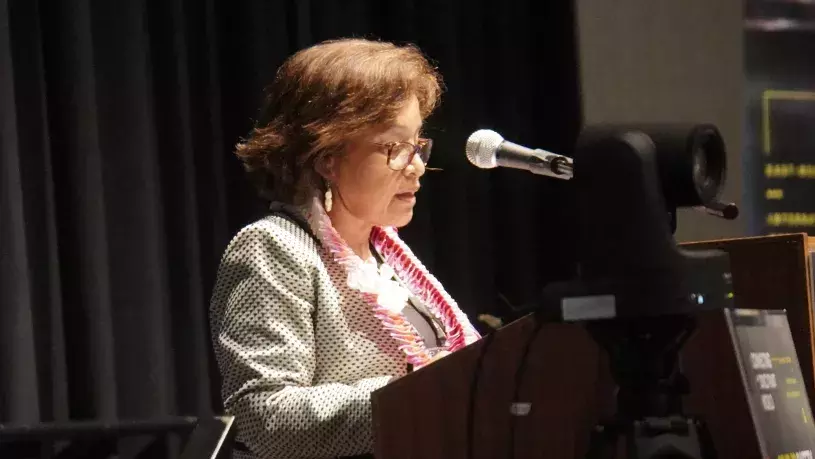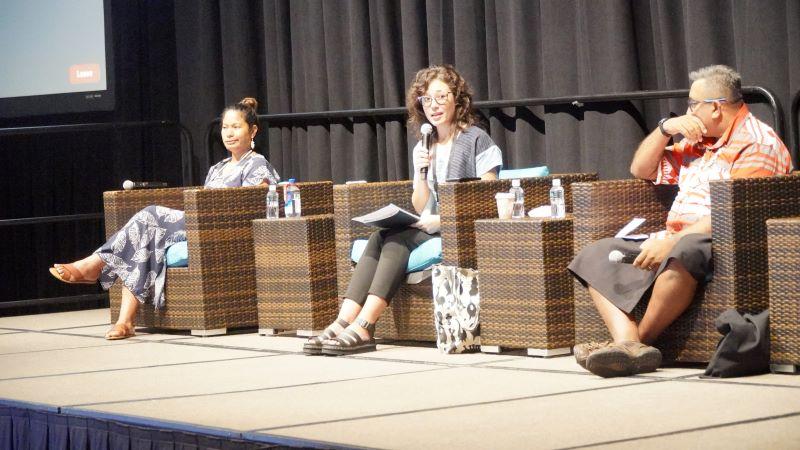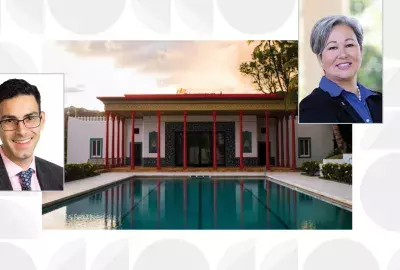Error message

Much coverage rife with stereotypes of hopelessness and helplessness, they say
Quick take
- Activists and scientists say the media too often paints Pacific peoples as powerless climate victims
- Young leaders are now speaking out about this, and new organizations are forming to help elevate positive local voices in climate coverage
HONOLULU (July 7, 2022) – At the East-West Center International Media Conference here last week, speakers from the Pacific Islands who are involved in climate change issues took Western media to task for maintaining a “drowning islands” narrative that they say dominates stories on global warming in the region and diminishes efforts to fight and adapt to the environmental crisis.
In a keynote address, former Marshall Islands President Hilda Heine said the news media have sharpened the public’s understanding of climate change. However, she cautioned against repeated negative focus on environmental impacts that can “leave the public with an overall sense of powerlessness,” paralyzing people into inaction.
Heine called for better coverage of the issues with updated information, science that people can understand, and more discussion related to solutions. “It's one thing to write about rising sea levels,” she said, “but quite something else when you're standing in a garden gone fallow because rising sea levels have fouled the atoll’s freshwater lens.”
Narrow framing
A similar theme was struck by climate researchers and Pacific Islands advocates during a conference discussion on shaping a new climate change message.
Studies on international media reporting on Pacific Islands climate change found that coverage overall had been marginal but then substantially increased since 2015, according to Victoria Keener, senior research fellow at the East-West Center and the discussion’s moderator. However, she said the dominant narrative of the coverage casts the islands as passive and vulnerable, and the reporting is “framed in colonialism and paternalistic themes.”

Tammy Tabe, Oceania research fellow at the East-West Center from the Solomon Islands, said she has encountered media covering environmental impacts in low-lying islands who will visit areas of coastal erosion but not other locations where examples of adaptation and resilience are underway. “The media has that control over what’s magnified in terms of vulnerability in Pacific Island countries, and it often displaces acts of daily resilience in terms of everyday activity that people carry out to adapt and to address a lot of these issues that they face,” she said.
Brianna Fruean, a 23-year-old Sāmoan climate activist whose speech at the 2021 COP26 United Nations climate summit in Glasgow drew global attention, is frequently interviewed by the press. But she said she is more often asked to describe the impacts of climate change rather than highlight young Pacific Islanders’ efforts to do something about them. “I feel like a lot of the times the media don’t let us be heroes,” Fruean said.
Narratives painting the region as lacking agency may already be shifting as young Pacific Island activists draw attention to positive climate change efforts, said Rev. James Bhagwan of Fiji, the general secretary of the Pacific Conference of Churches. But there is still a lot “that focus on victimhood rather than resilience and resistance” happening, he said.
Elevating local voices
Heine reflected on the challenge Pacific Islands peoples face in primarily relying on outsiders to tell their stories, whether about climate change or the dynamics between China and Western powers in the region. “The Anglo ways and China are often the only two sides which matter to the mainstream media and political discourse,” she said. “The third side, the Pacific’s ʻbig-ocean states,ʻ or BOSS, are often forgotten or relegated to the margin.”
One effort to inject more local perspectives into the media is the recent creation of the nonprofit Pacific Media Institute, she said, which among other goals seeks to train Marshall Islanders as effective communicators in print, broadcast, podcasts and other platforms. With this and other initiatives, Heine said she hopes “we no longer have to rely entirely on the good graces of others to tell our own stories about climate change and a host of other issues.”
Much coverage rife with stereotypes of hopelessness and helplessness, they say
Quick take
- Activists and scientists say the media too often paints Pacific peoples as powerless climate victims
- Young leaders are now speaking out about this, and new organizations are forming to help elevate positive local voices in climate coverage
HONOLULU (July 7, 2022) – At the East-West Center International Media Conference here last week, speakers from the Pacific Islands who are involved in climate change issues took Western media to task for maintaining a “drowning islands” narrative that they say dominates stories on global warming in the region and diminishes efforts to fight and adapt to the environmental crisis.
In a keynote address, former Marshall Islands President Hilda Heine said the news media have sharpened the public’s understanding of climate change. However, she cautioned against repeated negative focus on environmental impacts that can “leave the public with an overall sense of powerlessness,” paralyzing people into inaction.
Heine called for better coverage of the issues with updated information, science that people can understand, and more discussion related to solutions. “It's one thing to write about rising sea levels,” she said, “but quite something else when you're standing in a garden gone fallow because rising sea levels have fouled the atoll’s freshwater lens.”
Narrow framing
A similar theme was struck by climate researchers and Pacific Islands advocates during a conference discussion on shaping a new climate change message.
Studies on international media reporting on Pacific Islands climate change found that coverage overall had been marginal but then substantially increased since 2015, according to Victoria Keener, senior research fellow at the East-West Center and the discussion’s moderator. However, she said the dominant narrative of the coverage casts the islands as passive and vulnerable, and the reporting is “framed in colonialism and paternalistic themes.”

Tammy Tabe, Oceania research fellow at the East-West Center from the Solomon Islands, said she has encountered media covering environmental impacts in low-lying islands who will visit areas of coastal erosion but not other locations where examples of adaptation and resilience are underway. “The media has that control over what’s magnified in terms of vulnerability in Pacific Island countries, and it often displaces acts of daily resilience in terms of everyday activity that people carry out to adapt and to address a lot of these issues that they face,” she said.
Brianna Fruean, a 23-year-old Sāmoan climate activist whose speech at the 2021 COP26 United Nations climate summit in Glasgow drew global attention, is frequently interviewed by the press. But she said she is more often asked to describe the impacts of climate change rather than highlight young Pacific Islanders’ efforts to do something about them. “I feel like a lot of the times the media don’t let us be heroes,” Fruean said.
Narratives painting the region as lacking agency may already be shifting as young Pacific Island activists draw attention to positive climate change efforts, said Rev. James Bhagwan of Fiji, the general secretary of the Pacific Conference of Churches. But there is still a lot “that focus on victimhood rather than resilience and resistance” happening, he said.
Elevating local voices
Heine reflected on the challenge Pacific Islands peoples face in primarily relying on outsiders to tell their stories, whether about climate change or the dynamics between China and Western powers in the region. “The Anglo ways and China are often the only two sides which matter to the mainstream media and political discourse,” she said. “The third side, the Pacific’s ʻbig-ocean states,ʻ or BOSS, are often forgotten or relegated to the margin.”
One effort to inject more local perspectives into the media is the recent creation of the nonprofit Pacific Media Institute, she said, which among other goals seeks to train Marshall Islanders as effective communicators in print, broadcast, podcasts and other platforms. With this and other initiatives, Heine said she hopes “we no longer have to rely entirely on the good graces of others to tell our own stories about climate change and a host of other issues.”
East-West Wire
News, Commentary, and Analysis
The East-West Wire is a news, commentary, and analysis service provided by the East-West Center in Honolulu. Any part or all of the Wire content may be used by media with attribution to the East-West Center or the person quoted. To receive East-West Center Wire media releases via email, subscribe here.
For links to all East-West Center media programs, fellowships and services, see www.eastwestcenter.org/journalists.







